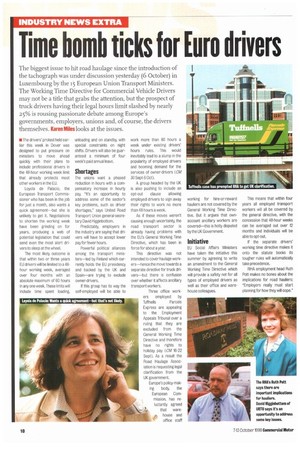Time bomb ticks for Euro drivers
Page 12

If you've noticed an error in this article please click here to report it so we can fix it.
The biggest issue to hit road haulage since the introduction of the tachograph was under discussion yesterday (6 October) in Luxembourg by the 15 European Union Transport Ministers. The Working Time Directive for Commercial Vehicle Drivers may not be a title that grabs the attention, but the prospect of truck drivers having their legal hours limit slashed by nearly 25% is rousing passionate debate among Europe's governments, employers, unions and, of course, the drivers themselves. Karen Miles looks at the issues.
111The drivers protest held earlier this week in Dover was designed to put pressure on ministers to move ahead quickly with their plans to include professional drivers in the 48-hour working week limit that already protects most other workers in the EU.
Loyola de Palacio, the European Transport Commissioner who has been in the job for just a month, also wants a quick agreement—but she is unlikely to get it. Negotiations to shorten the working week have been grinding on for years, producing a web of potential legislation that could send even the most alert drivers to sleep at the wheel.
The most likely outcome is that within two or three years EU drivers will be limited to a 48hour working week, averaged over four months with an absolute maximum of 60 hours in any one week. These limits will include time spent loading,
unloading and on standby, with special constraints on night shifts. Drivers will also be guaranteed a minimum of four week's paid annual leave.
Shortages
The unions want a phased reduction in hours with a compensatory increase in hourly pay. "It's an opportunity to address some of the sector's key problems, such as driver shortages," says United Road Transport Union general-secretary David Higginbottom.
Predictably employers in the industry are saying that drivers will have to accept lower pay for fewer hours.
Powerful political alliances among the transport ministers—led by Finland which currently holds the EU presidency and backed by the UK and Spain—are trying to exclude owner-drivers.
If this group has its way the self-employed will be able to work more than 80 hours a week under existing drivers' hours rules. This would inevitably lead to a slump in the popularity of employed drivers and booming demand for the services of owner-drivers (CM 30 Sept-6 Oct).
A group headed by the UK is also pushing to include an opt-out clause allowing employed drivers to sign away their rights to work no more than 48 hours a week.
As if these moves weren't causing enough uncertainty, the road transport sector is already having problems with the EU's General Working Time Directive, which has been in force for about a year.
This directive was not intended to cover haulage workers—hence the move towards a separate directive for truck drivers—but there is confusion over whether it affects ancillary transport workers.
Three office workers employed by Tuffnells Parcels Express are appealing to the Employment Appeals Tribunal over a ruling that they are excluded from the General Working lime Directive and therefore have no rights to holiday pay (CM 16-22 Sept). As a result the Road Haulage Association is requesting legal clarification from the UK government.
Europe's policy-mak ing body, the European Commission, has reluctantly agreed that warehouse and office staff
working for hire-or-reward hauliers are not covered by the General Working Time Directive. But it argues that ownaccount ancillary workers are covered—this is hotly disputed by the UK Government.
Initiative
EU Social Affairs Ministers have taken the initiative this summer by agreeing to write an amendment to the General Working Time Directive which will provide a safety net for all types of employed drivers as well as their office and warehouse colleagues.
This means that within four years all employed transport workers will all be covered by the general directive, with the concession that 48-hour weeks can be averaged out over 12 months and individuals will be able to opt-out.
If the separate drivers' working time directive makes it onto the statute books its tougher rules will automatically take precedence.
RHA employment head Ruth Pott makes no bones about the implications for road hauliers: "Employers really must start planning for how they will cope."




















































































































